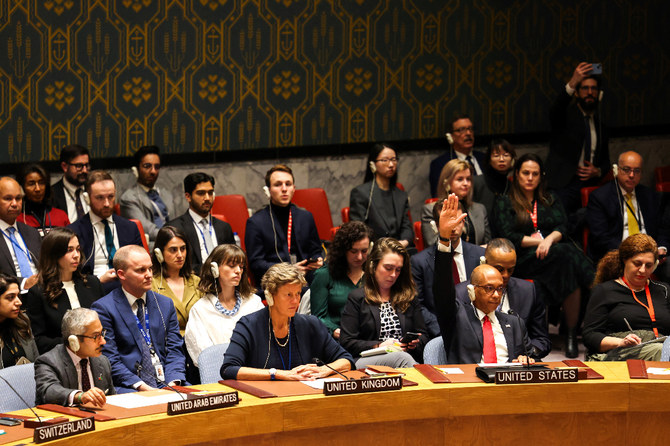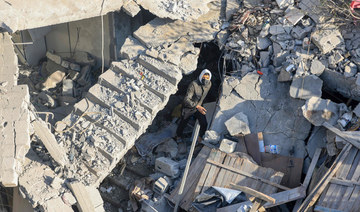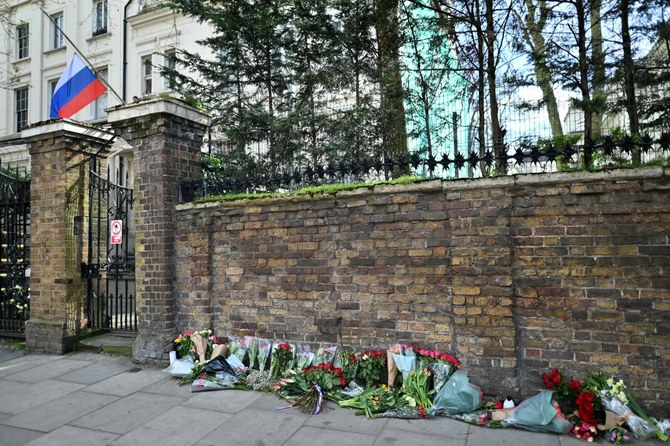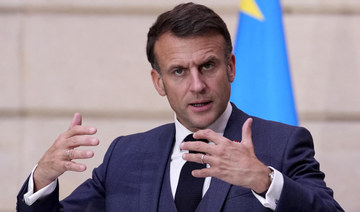NEW YORK CITY: The US on Friday blocked international calls for the UN Security Council to take action on the situation in Gaza by demanding a ceasefire. It vetoed a resolution for which 13 of the other 14 council members voted in favor, while the UK abstained.
Washington’s veto came amid unprecedented international calls to end the violence in Gaza, including a dramatic appeal by UN Secretary-General Antonio Guterres, who this week urged the council to demand a humanitarian ceasefire. Invoking the rarely used Article 99, one of the few powers granted to a secretary-general under the UN charter, he said a ceasefire is needed to help avert a humanitarian catastrophe that could have “potentially irreversible implications for Palestinians as a whole, and for peace and security in the region.”
Article 99 gives the secretary-general the power to bring to the attention of the Security Council “any matter which, in his opinion, may threaten the maintenance of international peace and security.”
Friday’s vote on the draft resolution, submitted by the UAE on behalf of the Arab Group of nations at the UN, also came as Arab ministers, led by Saudi Foreign Minister Faisal bin Farhan, met Secretary of State Antony Blinken in Washington in what appeared to be a last-ditch effort to convince Washington not to use its veto — a power it has as one of the five permanent members of the Security Council alongside the UK, Russia, France and China — to block adoption of the resolution.
The US veto came as no surprise, as the alternate permanent representative of the US to the UN, Robert Wood, told an earlier meeting of the council on Friday morning that his country did not support the calls for an immediate ceasefire, on the grounds that “this would only plant the seeds for the next war, because Hamas has no desire to see a durable peace, to see a two-state solution.”
It was the refusal of Hamas to release the young women it continues to hold hostage that resulted in the breakdown of the previous truce, he added, as he repeated the US position that “this council’s failure to condemn Hamas for its Oct. 7. terrorist attacks, including its acts of sexual violence and other unthinkable evils, is a serious moral failure.”
The resolution blocked on Friday called for “an immediate humanitarian ceasefire” in Gaza and “the immediate and unconditional release of all hostages, as well as ensuring humanitarian access.”
It expressed “grave concern over the catastrophic humanitarian situation in the Gaza Strip and the suffering of the Palestinian civilian population” and emphasized that “the Palestinian and Israeli civilian populations must be protected in accordance with international humanitarian law.”
Also on Friday morning, Guterres repeated his call for council members “to spare no effort to push for an immediate humanitarian ceasefire, for the protection of civilians, and for the urgent delivery of lifesaving aid.” He added that the “eyes of the world — and the eyes of history — are watching. Time to act.”
The UN chief has warned there is a high risk of a total collapse of the humanitarian support system in Gaza, which could potentially result in “a complete breakdown of public order and increased pressure for mass displacement into Egypt.” He spoke of his fears that this could have devastating repercussions for the security of the entire region.
Guterres described apocalyptic scenes in Gaza. He said attacks by air, land and sea are so intense and widespread that “they have reportedly hit 339 education facilities, 26 hospitals, 56 healthcare facilities, 88 mosques and three churches.
“Over 60 percent of Gaza’s housing has reportedly been destroyed or damaged — some 300,000 houses and apartments. Some 85 percent of the population have been forced from their homes.”
Under such circumstances, the delivery of humanitarian aid “has become impossible,” he added, and the “people of Gaza are being told to move like human pinballs, ricocheting between ever- smaller slivers of the south without any of the basics for survival.”
Nowhere in Gaza is safe now, Guterres said.
“At least 88 UNRWA (UN Relief and Works Agency for Palestine Refugees in the Near East) shelters have been hit, killing over 270 people and injuring over 900. Conditions in shelters are overcrowded and unsanitary. People nurse open wounds. Hundreds of people stand in line for hours to use one shower or toilet.”
He also warned of the “serious risk” of starvation and famine. According to the World Food Programme, 97 percent of households in Gaza do not have enough to eat and the agency’s own food supplies are running out.
Guterres also highlighted the collapse of the healthcare system in Gaza at a time when needs continue to rise, and the deaths of at least 286 health workers since the war began.
“Hospitals have suffered heavy bombardment,” he said. “Just 14 out of 36 are still functioning. Of these, three are providing basic first aid, while the others are delivering partial services.
“The unsanitary conditions in shelters and severe shortages of food and water are leading to increases in respiratory infections, scabies, jaundice and diarrhea.
“Everything I have just described represents an unprecedented situation that led to my unprecedented decision to invoke Article 99, urging the members of the Security Council to press to avert a humanitarian catastrophe, and appealing for a humanitarian ceasefire to be declared.”
Ahead of the vote, Riyad Mansour, the permanent observer of Palestine to the UN, asked council members: “Are we supposed to pretend we don’t know (Israel’s) objective is the ethnic cleansing of the Gaza Strip?
“If you are against the destruction and displacement of the Palestinian people, you have to be in favor of an immediate ceasefire.
“Regardless of how good your intentions are, how genuine your efforts are, this is the moment of truth. This war is part of the assault to end the Palestinian people as a nation and to destroy the question of Palestine. If you do not share this objective, you must stand against the war.”
Israel’s permanent representative to the UN, Gilad Erdan, told council members: “Calling for a ceasefire sends a clear message that Hamas is forgiven for their deliberate atrocities.
“Hamas exploits Gazans as human shields in hopes that civilian casualties will rise and the UN will call for a ceasefire. Do we want to be the actors in this show that Hamas has carefully crafted?”
Blaming Hamas for the humanitarian situation in Gaza, Erdan said: “If this council wants to see a ceasefire, start by demanding it from Hamas, the party that broke the past two.”
The UAE’s deputy permanent representative to the UN, Mohammed Abushahab, told the council that the scale of the destruction in Gaza surpasses even the bombing of Dresden in 1945, during the Second World War.
“We condemn in the strongest possible terms the deliberate targeting of medical facilities, equipment and personnel,” he said.
China’s permanent representative to UN, Zhang Jun, whose country co-sponsored the Emirati resolution, said that it “reflects the universal core of the international community and represents the right direction for the restoration of peace.”
He added: “This human catastrophe is too great for words to describe … any waiting or delay means more death. At this juncture, only a ceasefire can avoid the headache of regional conflagration.”
























